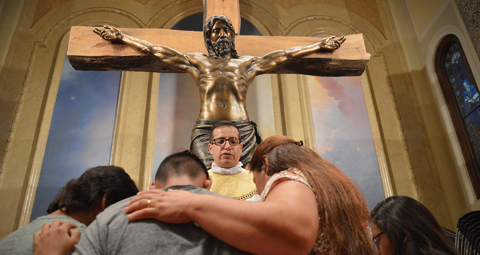June 16 | ![]() 0 COMMENTS
0 COMMENTS ![]() print
print

The forgotten obligation to attend Mass
The Church in Scotland is adapting to serve ‘practise Catholics,’ THE BOW IN THE HEAVENS argues -By Fr John Bollan
I’m back on call for the hospital this week. The last time I was called out I found myself having to be ‘gowned, masked and gloved- up.’ I use the passive voice deliberately, as I’m so ‘haunless’ I literally have to be dressed by one of the nurses. There was a revealing little exchange as I was being wrapped in the yellow cellophane apron. I asked the nurse, ‘What could I catch?’ To which the nurse replied, somewhat ruefully, ‘It’s more about what you could give them.’ I guess that says a lot about me, if I’m being honest.
Pope Francis is fond of comparing the Church to a field hospital, tending the walking wounded of our society. I reckon he’s on to something. Although, I’ve been doing quite a lot of reflecting on this theme of late, especially when it comes to evangelising and reaching out to the world with the Gospel.
It arises from something which many priests would say (and I would agree with): “Give me a good funeral over a wedding any day.” That might sound a bit odd, but it’s fairly accurate. Most weddings see the Church as a venue, a ‘bit’ of the day, but not always the most important part. Couples regularly ask how long the service will take so that the really important stuff like the photographs and receptions can be put in place.
When it comes to funerals, however, the traditional wisdom is that people are much more attentive. Death tends to make people stop and listen a bit more carefully to what you are saying.
As a result, many priests see this as a great opportunity to get through to a large number of Catholics who would not normally be in your Church of a Sunday.
But here’s the thing that gets me. I am generally reckoned to ‘do’ a lovely funeral. I spend a lot of time visiting bereaved families at home, I feel I get to know them (and vice versa) and, if the deceased wasn’t known to me personally, I can usually work with whatever material they can give me into a homily which laces the proclamation of the resurrection with enough personal touches as to be distinctly ‘theirs.’
The subsequent expressions of thanks are profuse and sincere. But if, like 70 per cent of the folk in the parish, they don’t regularly frequent the church, will they actually be back at Mass the next Sunday? The answer is, sadly, probably not.
Now, don’t get me wrong. These are good people. You have a sense that they really appreciate what you are doing for them in a time of real difficulty and sadness, but it won’t have much impact on their ‘normal’ lives. Why is that?
I think that something has shifted in the mindset of Catholics, at least in this corner of the Lord’s vineyard.
We seem to have lost the understanding of there being an obligation to attend Mass. As a result, while the vast majority of Catholics hereabouts do not attend Mass, they would be deeply insulted if you described them as ‘lapsed.’
That term, frequently used by the Church, has no real meaning for them. They would be even more horrified if you were to question whether they are still Catholics in any serious sense of the word.
And this is all to do with a different model or understanding of the Church which has come into existence in Bow Farm and no doubt elsewhere.
It’s not so much the Church as hospital as the Church as medical practice. The Church and the parish are still an absolutely vital part of the community and of these people’s lives, but it’s just that their relationship to it has changed.
The folk hereabouts know which ‘practice’ they’re under and they are very loyal to it in the way that people tend to stick with doctors and nurses they’re familiar with.
They know the Church is there for them when they are in pain, or when they need help and they are deeply grateful for the support it offers them. But I reckon that most of them would no more consider ‘coming back’ to church after a bereavement than they would turn up at their doctor’s surgery to say they’re feeling much better now. That’s simply not how their relationship with the Church works nowadays.
Naturally, that throws up lots of questions and not a few challenges. It makes the work of inviting people to be a part of the life of the parish that bit trickier, especially if you’re also trying to make that message clear at other ‘entry points’ such as Baptism and the other Sacraments.
Furthermore, it challenges us to find ways to make people aware that opting out of Mass isn’t a neutral lifestyle choice, like so many others nowadays. There are negative effects, as well as missed graces.
But I think that it also means that we, as clergy and lay people working in the field of new evangelisation, need to be less hard on ourselves if we think that our best efforts are not really producing results in the return of ‘lapsed’ Catholics. It’s just that they don’t see themselves in that position at all.
I suspect that what we have in most Catholic communities is a minority of ‘practicing Catholics’ and a considerable majority of ‘practice Catholics.’
My goodness, I’m so pleased with that term, I think I’ll copyright it.
An unfortunate consequence of being on call for the hospital is that I had to forego the pleasure of the Sixth Year prom in Largs. Things have certainly changed since my young day, when we gathered in fairly casual dress for a ‘leavers’ disco’ in a local snooker hall.
The prom is just the tip of an iceberg of the Americanisation of our culture, especially that of our youth. Each year I contribute a foreword to the leavers’ yearbook, crammed with photos and reminiscences of these departing senior students.
Unique as our lot are, I reckon the final product is pretty much indistinguishable from any such Class of ’17 yearbook anywhere in the States.
The prom itself is one of those American rites of passage which has seized the imagination of our young folk.
They look great in their prom dresses, kilts or tuxedos and they certainly go to town on the ‘traditional trimmings’—not least the corsages (until very recently I genuinely thought corsage was a vegetable) and the pre-prom photoshoots.
Thankfully, our school has taken the very prudent step of laying on a bus for the kids which transports them to and from the plush hotel venue. This means we avoid small groups of kids hiring ruinously expensive stretch limos and having prosecco-fuelled tours of local housing estates.
In truth, our prom begins very nicely with a short prayer service in the school which is attended by the departing students, their families and teachers. This gives them an opportunity to give thanks to God for their years in the school but also to express their thanks to their parents, families and carers who have, for the most part, bankrolled their prom tickets and glad rags (and just about everything else in their lives).
To be honest, I’m sad I won’t be able to join them for their last big night. A few years ago I invested in a kilt for use on occasions such as this, in the Dark Island tartan which is so dark as to be almost black.
It goes perfectly with clerical dress and I’ve received many a compliment on my shapely fetlocks, seldom glimpsed beneath the soutane. Alas, this year I shall have to make do with toasting the Class of ‘17 with our carbonated national drink and hope that the hospital switchboard leaves me in peace for a while.










